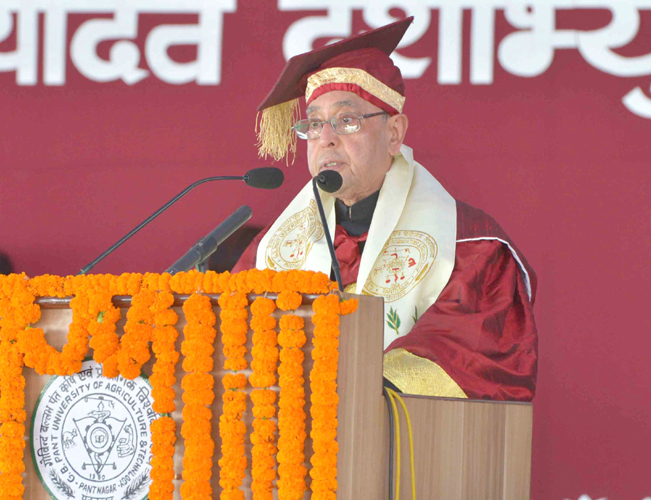
PANTNAGAR (Uttarakhand), Nov 17: Citing decreasing land availability coupled with a rising population, President Pranab Mukherjee today stressed upon ways to preserve natural resources to ensure continuous supply of food and fresh water in the country.
Citing about 120 million hectares of land at various stages of degradation, he also emphasised upon adoption of more sustainable land use systems and soil management practices.
“We surmounted the challenge to food security then. But what about now, when we are confronted with decreasing land availability for agriculture coupled with a rising population? When deterioration in soil health and water quality is reducing agriculture productivity and input use efficiency?,” Mukherjee said.
He said the dimensions of food security are many.
The level of nutrition in food produce is an important determinant of food sufficiency in the population.
In the Global Hunger Index 2015, which combines the three indicators of under-nourishment, child under-weight and child mortality, India is ranked 80th out of 104 countries.
“This is totally unacceptable. We have to improve the nutritional status of our population in a time-bound manner,” the President said.
He said people must work hard to preserve our natural resources to continuously receive provisioning service such as food and fresh water; regulating service like climate and pest regulation; cultural service such as educational and eco-tourism; and supporting service like soil formation and nutrient cycling.
Addressing students and staff during 29th convocation of Govind Ballabh Pant University of Agriculture and Technology here, the President said agriculture is the mainstay of country’s economy.
“More than 50 per cent of our population relies on this sector for earning a livelihood. Its healthy growth determines the quality of food security.
“Agriculture has always received top priority in our policy formulation because early in our planning process, we recognised that we ourselves have to feed our growing population which today stands at 1.28 billion,” he said.
The institute, which was set up in 1960, is the first agricultural university to be established in India on the land-grant pattern of agricultural universities in the US.
It is also recognised as the birthplace of the green revolution.
“This University has earned its reputation through years of hard work. It has the potential to be amongst the front-ranking institutions in the world.
“If due attention is paid to the ranking process, I am confident it will appear amongst the top 200 universities in the world in the next couple of years,” the President said.
Mukherjee said steps taken by the government in the sixties – R&D programmes, procurement and adoption of high yielding seed varieties and improved agricultural practices – resulted in rapid expansion of food production.
He said the injudicious exploitation has already put the earth system in India at risk by leading to climate change and bio-diversity loss.
“We need new approaches to manage these risks. The climate is changing and is bound to change, but should it change so fast? What would be the increased water, energy and nutrient requirements? What strategy for mitigation and adaptation would be needed when more and more will have to be produced with less and less resources?,” Mukherjee asked. (PTI)

